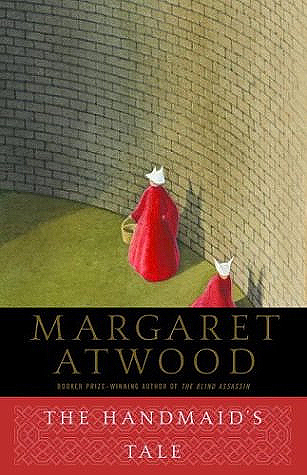Today I'm looking at another book which was recommended to me by a friend, The Handmaid's Tale by Margaret Atwood. This is mostly a feminist social commentary with only very, very light sci-fi elements so it's just the slightest bit outside my usual bailiwick. However I think this is a very important book because the issues it addresses have not gone away. In some cases you might be able to say they've even become more important with the emergence of various Men's Rights Activists and Red-pillers. It is hardly a subtle book, but that makes it no less valid.
The plot of The Handmaid's Tale takes place in New England at some undetermined future point. Christian extremists assassinated most of the American government and suspended the Constitution, establishing a strict, orthodox, militant, religious, and patriarchal society called the Republic of Gilead. The Republic's forces are involved in wars with dissident groups such as Baptists and Methodists across the country and it's implied a majority of the male population are involved in fighting these wars. Women, however, have been relegated to only a handful of roles.
Wives occupy the highest ranks of the hierarchy, dress entirely in blue, and enjoy relative luxury. Next are the Aunts, older unmarried women who are the only women allowed to read and write and serve as disciplinarians for the female population. Then there are the Marthas who dress entirely in green and do all the cooking, cleaning, and other ''traditional'' domestic tasks. There are also Econowives who dress in a mixture of green, blue, and red because their husbands are not high enough status to be granted a Wife and a Martha so all of the work falls upon them. At the bottom of this hierarchy are the Handmaids, who are dressed entirely in red and exist only as breeding stock.
It's implied that the results of chemical and atomic war have greatly reduced the population capable of producing viable offspring and Gilead faces a shortage of births. Part of their solution is the system of Handmaids, who are moved from house to house so they can produce as many babies as possible. The Handmaids are given almost no important tasks and their entire value is wrapped up in their ability to bear children. They are not even given proper names but merely referred to by the name of their owner. The main character, whose real name we never learn, serves a man named Fred so she is called Offred, while other Handmaids are called Ofglen, Ofcharles, and so on. If a Handmaid proves unable to bear children they're sent to the Colonies with other societal rejects.
The book does a very good job of showing the tedium, desperation, and deeply dehumanizing experience of women under this system. All women are required to wear clothing which conceals everything but their heads and sometimes their hands. And in the case of the Handmaids, they are required to wear headgear outside the house which covers their head and makes their face difficult to see, to remove all temptation the sight of women provides men. This is described by the Republic of Gilead as a good thing for women because it makes them free from the problems women experienced prior to the Republic, such as unwanted sexual advances, cat-calling, and even rape, but we see very much how the misbehavior of men is used as a mean to punish and control women in the name of ''protecting'' them.
One of the biggest themes is the enforced tedium of the lives of the women because they are relegated to the domestic sphere The Handmaids are severely restricted in what they're allowed to do because their ability to bear children is seen as a vital and necessary resource. The Marthas, of course, have to perform all the necessary domestic labor and receive little to no thanks for it and certainly no break from the endless labor. Even the life of the Wives is shown as little better than a gilded cage. They may enjoy endless creature comforts and lives of relative ease, but there is the frustration of not being able to do anything. The women are just passing time until they die, imprisoned in their own houses.
This book is about as subtle as a sledgehammer, but I think sometimes that lack of subtlety is needed in a book. Although The Handmaid's Tale was published in 1986, it unfortunately remains very relevant today. The support of various people for ''traditional gender roles'' (which incidentally weren't a thing until the nineteenth century for most people) and assertions that women need to be protected and cherished in the home, remaining unsullied by the dangerous world dominated by men. Not to mention the constant criticism of what women are wearing, whether it's too conservative or too licentious, and the inevitable rounds of victim-blaming that happen after a high-profile rape case. On some level, I wish American society had gotten to a point where we could look at The Handmaid's Tale and see it as a quaint criticism of social issues as they existed in a previous era. Unfortunately, much like criticism of racism, it remains very valid today and shows America has a long way to go.
- Kalpar


No comments:
Post a Comment